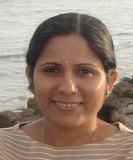
By Nirooshitha Sethuram
Having just married Kunti, Pandu went to war, conquering or allying with many kingdoms in the name of Hastinapura. When he approached the Madra Kingdom, he found a huge army awaiting him. During the battle, he saw King Shalya’s charioteer driving the chariot as fast as lightning. After the war ended in a truce, Shalya revealed that the charioteer was none other than his own sister, Madri. Shalya proposed that the two kingdoms avoid war in the future through marriage and a gift of their friendship. Pandu accepted his wish willingly and married Madri.
He brought his new bride to Hastinapura. At the first sight of another woman with her husband, and due to the behavior of Madri acting smart, Kunti got a bit upset. But as time passed, she became a loving sister of Madri. However, Madri continued to have a little bit of a superiority complex, thinking that the kingdom of Madra was superior to the kingdom of the Yadavas, the cattle clan, into which Kunti was born. But they were both devoted to Pandu and Pandu loved them both equally. They later grew into loving each other as sisters.
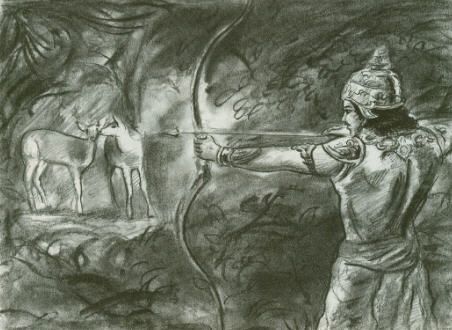
Under Pandu’s rule, the Hastinapura kingdom flourished. He was a passionate hunter and an excellent archer. During one of his hunting trips, he killed a pair of deer who were engaged in romance, which was against the rules of hunting. The pair was Rishi Kindama and his wife who were making love in the form of deer. The dying sage placed a curse on Pandu, that if he were to approach his wife with the intent of sexual relations, his head would explode and he would die. Before Pandu could defend himself, the sage died. With the curse on his head, he returns to the palace with a heavy heart.
He couldn’t forgive himself for the crime he committed. He decided to abdicate the throne of Hastinapura and go into a hermetical retreat. Bhishma and Vidura tried convincing him otherwise, but Pandu couldn’t be convinced. The governance of Hastinapura, in the absence of a king, was bestowed upon Dhritarashtra, until Pandu returned or Pandu’s son came to claim the throne. Dhritarashtra was happy to be the governor of Hastinapura, thinking that, due to Pandu’s curse, he and his children will get to rule the kingdom. Pandu left for his hermetical retreat with by his two wives, Kunti and Madri.
Pandu got unhappier by the day due to not being able to give an heir to the Hastinapura kingdom. Also Kunti and Madri were directly affected by the curse as they were denied the opportunity to bear children. Kunti had not revealed to anyone the boon she had, due to the secret she carried with it, her first-born whom she left afloat in the river Ganga.
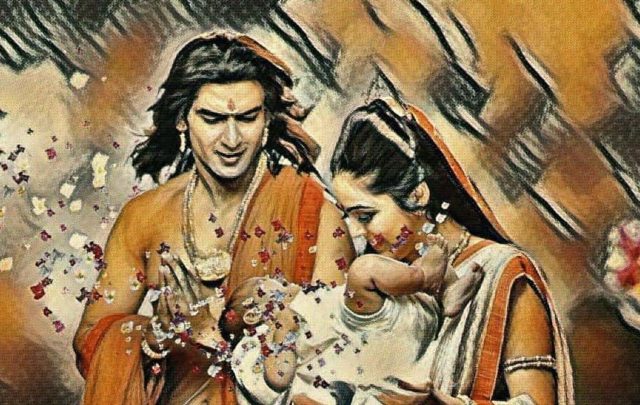
Unable to bear husband’s sorrow, Kunti revealed the boon that she received from Sage Durvasa, though not about her first-born, Karna. When Pandu heard about this blessing, he was in ecstasy. He asked Kunti to use the five mantras to give birth to heirs to the Hastinapura kingdom.
First, Pandu suggested that Kunti call Dharmaraj, to get a truthful, knowledgeable and righteous son to rule Hastinapura. Kunti used the Mantra for Dharmaraj, the God of Dharma, Lord Yama. Dharmaraj appeared and gave Kunti the boon of a son. This eldest son of Pandu was named Yudhishthira. Pandu was overjoyed, as he had become a father.
He asked Kunti to use her second mantra. This time she called upon the Vayu Bhagavan, the God of Wind. Vayu Bhagavan appeared and gave Kunti the second son. A big fat bonny baby, they called him Bhima.
Then Kunti invited God Indra, the king of the Devas, as requested by Pandu, Indra gave her their third son, who they named Arjuna.
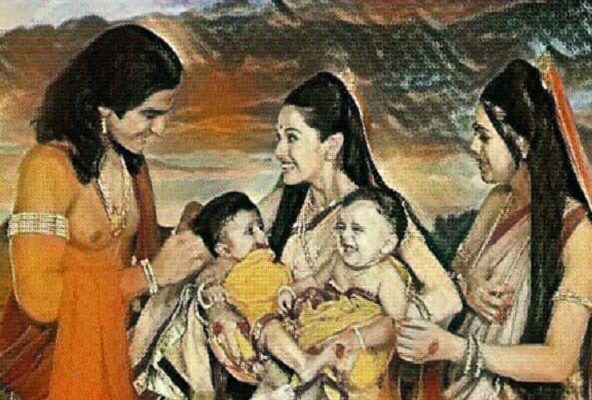
Pandu wanted more children and asked Kunti to use the rest of the two mantras she had. Kunti thought for a minute and called Madri, who was feeling sad as she was not part of bearing children for her husband, Pandu. Kunti gave the final two mantras to Madri to use for the boon from the Ashwini Kumaras, the divine twin horsemen, who were Physicians for all the other Devas. They appeared in front of Madri and gave her twin sons, Nakula and Sahadeva. Madri was so thankful to Kunti, and from that day forward, they became two mothers with one heart.
Pandu was filled with happiness and thanked Kunti for keeping his dynasty going. Pandu and his family continued to live in the forest hermitage happily. These five children were called the Pandavas.
In the meantime, in Hastinapura, Gandhari was carrying her child for more than a year. Dhritarashtra was furious about the delay in his child’s birth. To revenge Gandhari, he took one of Gandhari’s maids to bed. On top of all this, hearing the news about the birth of Kunti’s eldest child made things worse for Gandhari. She fell into jealousy and frustration, hit her stomach so strong, desperately wanting to give birth, only to result in the birth of lump of flesh.
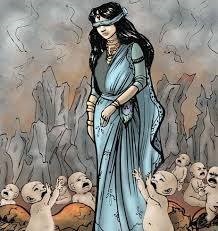
Once again Great-grand Queen Satyavati’s firstborn Vyasa came to the rescue. With the help from Sage Vyasa, Gandhari’s lump of flesh turned into hundred sons and a daughter. The hundred sons were the blessings of Lord Shiva to Gandhari and the daughter was an additional blessing from Vyasa himself. Among the hundred sons of Dhritarashtra and Gandhari, the eldest was named Duryodhana, meaning unconquerable, the second born was named Dushasana, meaning bad governance and the third was named Vikarna, meaning large eared. The daughter was Dushala.
Dhritarashtra loved them all very much, especially Duryodhana. Dhritarashtra also had a son named Yuyutsu, from the maid, making him a half-brother to the children of Gandhari. The hundred sons of Dhritarashtra and Gandhari were called the Kauravas. Even though Kauravas were born as a blessing from Lord Shiva, their untimely arrival was at an inauspicious time, due to Gandhari’s impatience. This changed their destiny forever.
A few years passed and the children were growing up. Yudhishthira, being the oldest was very mature and saw the good in every person, even of the worst people. As he was a boon of Dharmaraj, Yudhishthira upheld the Dharma, righteousness all the time, never to lie and always to keep his word. He was always following the path of Dharma.
Bhima was mighty as the wind, having the power of hundred elephants. He was a great fan of food. His appetite was so huge such that he would consume half of the food prepared by Kunti and Madri. He was the strongest of the five.
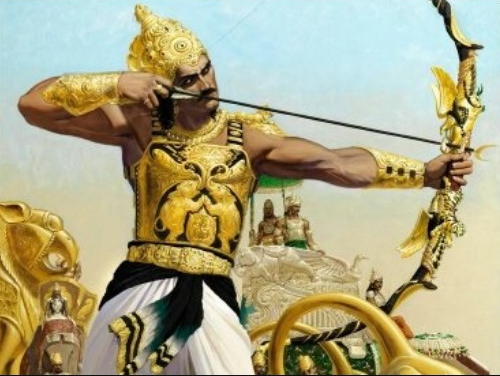
Arjuna had the skills like no other, in politics and the art of warfare. He was the most loving of them all, giving affection towards all his loved ones. His skill in archery was amazing.
Nakula was great in religion and science, he was the most handsome of them all. He was also Bhima’s favorite brother. He made fun of Bhima and his appetite any chance he got.
Sahadeva was a very learned, the most knowledgeable of the five. He was an astrologer beyond any other. He had great intuition and could foresee the near future. His intuition never failed him and his brothers.
Kunti and Madri looked after the five without any difference. They preached to the five to be always united, never to divide. They explained that if they were united, no power would be able to defeat them. They always obeyed their mothers’ wishes. If one got punished, all of them took the same punishment and when one was praised all of them took the praise.
In Hastinapura, Duryodhana and his brothers were growing up too. Shakuni, the brother of Gandhari, was always with the children, ill advising them and making them hate their cousins, the children of Pandu who were in the hermitage with Pandu, even before the Kauravas knew the Pandavas.
One day, Madri as usual was plucking flowers in the garden. By the looks of Madri, Pandu felt desire for Madri. The memory of the curse briefly eluded him. He approached her filled with desire; death struck Pandu immediately. Madri was filled with remorse.
Pandu’s death brought so much grief to Kunti, Madri and the Pandavas. Kunti, being the first wife, decided to become “sati,” meaning to throw herself on her husband’s funeral pyre. This worried Madri as she thought Kunti would be a better mother to the Pandavas than her. Also, her guilt at being the cause of her husband’s death, prevented her to live another day on earth without him. She knew Kunti would do justice to all the five children and that she could leave them in her motherly care while joining her husband peacefully.
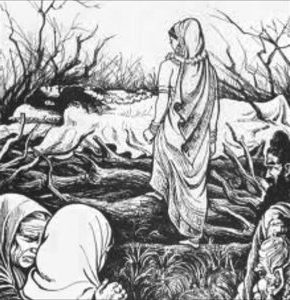
At first Kunti refused the idea. After Madri’s enormous efforts, at last Kunti was convinced and agreed. She promised Madri that she had always considered Nakula and Sahadeva as her own children and now more than ever she would give special attention towards them. Hearing this Madri sat with Pandu’s dead body on the funeral pyre and became “sati.” Kunti performed the last rites with the five children. She vowed to dedicate herself to the upbringing of the Pandavas. The Pandavas under the loving care of their mother Kunti became a united force.
The Rishis of the forest took them to Hastinapura to hand them over to Bhishma. The eldest of the Pandavas, Yudhishthira was sixteen. The dreadful news about Pandu’s death had reached the palace. Bhishma immediately rushed in with Vidura, Dhritarashtra and all the royal family members to welcome Kunti and the Pandavas. The whole of Hastinapura mourned Pandu’s death as though one of their family members had died. It showed that Pandu was loved by all the citizens of Hastinapura wholeheartedly. The Sage Vyasa warned Great-grand Queen Satyavati, saying that all that had happened until now was to be considered good compared to what would happen in the future of Hastinapura. There would be deceit, hatred and sorrow. He advised her not to witness this by staying at the palace, but to go to the forest to live peacefully in her old days, living a hermit’s life. After listening to her Sage son’s advice, Satyavati agreed to leave the palace with her two daughters-in-law, Ambika and Ambalika. All three of them lived a hermitic life through their last days on earth, escaping the horrible future of Hastinapura.
More to come…